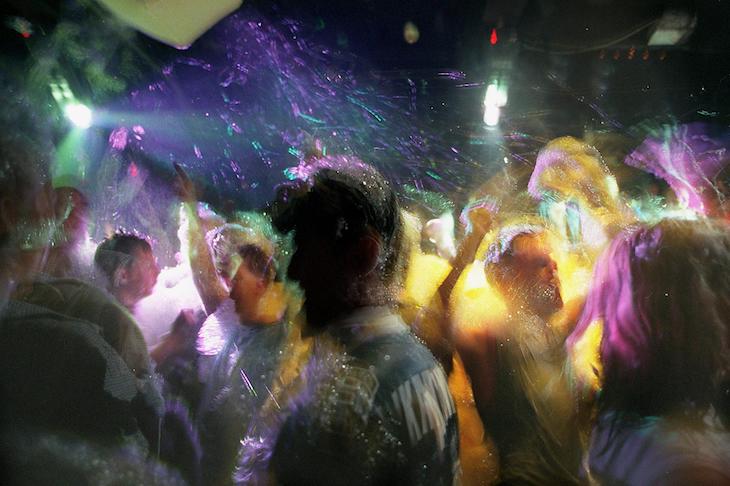It was approximately 4.50 a.m. in Ibiza: peak time on the dance floor. I was on the decks in one of the many sumptuous rooms of the superclub Pacha, spinning breakbeat on vinyl (early Noughties) and warming up for a live broadcast back to the UK.
Without warning, a Pacha henchman burst into the DJ booth, grabbed the record I was playing and pulled it off the deck. Then he yanked the headphones off my head.
‘Hey, what are you doing?’ was my astonished response. ‘We are going live on radio in ten minutes!’
This did not cut any ice. Pandemonium ensued. There was a fight on the dance floor between differing factions of the club’s management. I was bustled ‘for my own safety’, live mic in hand, to the basement kitchens for the rest of the night. In Ibiza’s money-spinning mecca I had committed the crime of playing tunes that were ‘off-message’, i.e. not commercial house music. This is not allowed to happen on Ibiza.
Looking in detail at contemporary dance music culture, now worldwide in its reach, Matthew Collin’s Rave On shows how we reached this state of affairs. When he wrote Altered State 20 years ago, several publishers believed that his subject matter was a passing fad, about to be eclipsed by grunge. Not worth a book. They were wrong — and now Rave On is as relevant, if not more so. Dance music has become a £7 billion a year business. One DJ, Calvin Harris from Dumfries, has been known to clock up $53 million in a year.
Late 1980s rave culture started, as is well known, with four young Brits on holiday in Ibiza discovering the club scene there. Inspired by the Balearic sound, they brought it home, made holiday clothes into youth fashion and initiated clubs such as Shoom. Next thing you knew, there were smiley face stickers on the tube and panicky Sun headlines about ecstasy. (The drug is now known in China as the ‘nodding head pill’.)
Collin looks at techno from Detroit, Chicago house, Berlin’s unique and uncompromising electronica and the beaches of Goa in India, which became a trance go-to. The latest territories to be explored and exploited are the Middle East and China:
Upmarket clubs in Shanghai often engaged prestigious Western guest DJs, but the vibe was all about conspicuous consumption, not sweaty raving. The Linx club even had a VIP area that was periodically raised up by hydraulic pumps so that the less wealthy could watch their betters sipping their champagne above them. Waiters put on a little show every time someone ordered a particularly expensive bottle; sparklers fizzed in jeroboams of top-marque fizz and showgirls pranced around to pay the appropriate respect to the big swinging dick who was paying the bill.
A contrasting footnote to Collin’s Shanghai tales is quite astounding. Ever wondered where your discarded CDs went? To the deprived Chinese music fans of Guangzhou, it turns out, who first discovered electronic (and other) Western music by scavenging rubbish tips. China was importing, then bulk-dumping, CDs and cassettes which had been sent for cheap disposal from the West. These recordings included types of music banned for decades in China, and as all the accompanying plastic cases were deliberately smashed, the detectorists had no idea of the provenance of their foraging. Joy Division and hip hop among them, apparently.
In Europe, Ibiza retains its dominance as the holiday dance capital of Europe. Working on the principle of ‘If it ain’t broke, don’t fix it’, the promoters and superclub owners guard their turf with ruthless efficiency. I’m not the only DJ to have been dragged off the decks. Why would the Ibicencos want to risk playing anything risky or alternative when there is so much dosh to be had from keeping sweet the international party elite who dominate the island’s clubs in summer?
House music is now as much an established genre as rock or reggae. The original ‘Balearic beat’, played by local DJs such as Alfredo, was edged out as the stakes got higher. Favoured DJs now fly in on private jets and are promoted on massive billboards, Sunset Strip style, right along the route from Eivissa airport to San Antonio, the main holiday resort.
A curious twist in the international dance story has come via that age-old centre of showbiz extravagance Las Vegas. The desert city has reinvented itself from the Sinatra and Celine Dion cabaret era to become a rave paradise. But the US version has evolved into the somewhat Disneyfied EDM — electronic dance music — a term now spoken of with derision by some back-in-the-day vinyl-spinners. They accuse today’s superstar DJs, with firework displays, huge stage screens and video walls, of being just ‘press and play’ merchants, their music ready-mixed. But hey, there were once purists who scoffed at them for not playing music created by ‘real musicians playing real instruments’. (I had that comment made to me once, djing in Wales.)
Elsewhere in Europe traces of the early, idealistic rave scene persist. Spiral Tribe, hugely influential from the late 1980s, retreated to mainland Europe after the Battle of Castlemorton in Worcestershire in 1992. This triggered the anti rave ‘repetitive beats’ public order act of parliament two years later. Teknivals, playing more authentic techno, still launch events across Europe from their largest base in France. And in Ukraine the roving travelling parties there are more about alternative communities than dance music.
Matthew Collin has found pockets of resistance to the relentless commodification of dance in other unexpected places: Dubai, Israel, Crimea and South Africa. There’s genuinely innovative music in south-east London and Atlanta Georgia, right now.Somewhere or other, the underground will always find a way.
As Europeans we have evangelised for rave for more than three decades now. As this meticulously researched, superb book shows, the results have been some strange and unexpected hybrids around the world. I remain — as, clearly, does Collin — fascinated.






Comments